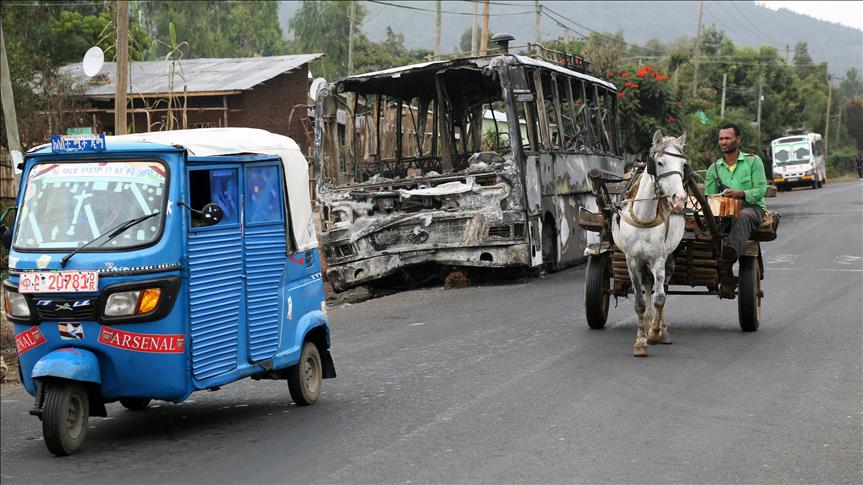
Ethiopia
By Addis Getachew, Seleshi Tessema, Tufan Aktas and Abebech Tamene
ADDIS ABABA, Ethiopia
Normal life is returning to Sebeta a week after violent protests rocked the burgeoning industrial town, located some 24 kilometers (14.9 miles) west of the Ethiopian capital Addis Ababa.
Angry protesters attacked factories during demonstrations but now the area is teeming with activity; schools, banks, roads and markets are all open.
After Oct. 2 protests in the south-central town of Bushoftu saw scores killed in a stampede when security forces fired bullets and teargas to disperse protesters, many towns in Oromia -- the largest and most populous regional state in Ethiopia -- witnessed violent protests.
The government declared a state of emergency, alleging foreign intervention lay behind violence in the area.
There is now heavy military presence in Oromia, including Sebeta.
Leaders of opposition political parties and some foreign governments fear the Ethiopian leadership may use the recently imposed emergency laws to further clamp down on dissent and stifle popular demands.
Merera Gudina, chairman of the Oromo Federalist Congress (OFC), told Anadolu Agency: “The center of the problem is that their [government’s] ideology doesn’t allow for any independent institution.”
Hinting at widespread cronyism, Merera said: “Institutions like the judiciary and media are controlled by the ruling party. Privatization of institutions works in the interest of one group.
“Public outrage started in 2014 due to the displacement and eviction of farmers from their land. The displaced are paid only $2,500 in compensation but the government sells the land at $2.5 million. The government pays in peanuts and resells the land in millions,” he said.
“Investors should know how the local farmers are displaced and their livelihoods are at stake,” Merera added. “People are not against development, but investment should not be at the destruction of their livelihoods.”
Gebru Gebremariam, vice-chairman of Medrek, a coalition of four parties, said: “We have been repeatedly appealing to the [ruling] EPRDF to allow us to stage a peaceful demonstration; unfortunately, we were denied [the right] to do so.
“The cumulative effect of the denial ended up in public outrage and now everything is in disarray. In five days alone, we lost over 700 young people.”
However, the government has claimed the opposition and international rights groups have exaggerated casualty figures from the Bushoftu violence.
“If the world cannot see this properly who shall we appeal to? What is the United Nations there for?” Gebru asked.
The U.S. has asked the government of Ethiopia to explain the necessity for a state of emergency.
‘Free elections’ call
Gebru said there was a need for a credible, acceptable, free, fair and all-embracing election in the country.
“If the guys [EPRDF] are to save the country, urgent elections should be held,” he said.
“The first step to be taken is that the election should be observed by international observers -- not by peer observers of the African Union,” he said. “People should also be free to vote without seeing any guns at polling stations.”
Gebru also highlighted the significance of a transitional-type government, emerging out of a consensus of all Ethiopians.
The government does not, however, recognize such demands as legitimate especially since it believes the popular mandate given to it in the May 2015 election allows the ruling party, in tandem with affiliates, to control all parliamentary seats.
What has changed is the government’s recognition of unmet public grievances, which it swore to address through “deep” reforms.
In an address to parliament on Monday, President Mulatu Teshome said: “Most of the protesters are youngsters.”
He indicated the need for the government to create jobs and announced the decision of his administration to establish a revolving fund.
For Chane Kebede, the head of the Ethiopian Democratic Party, these government pledges to reform seem to be “too little, too late”.
He dubbed the current political situation in the country “a crisis”.
For Abebe Aynete, a political analyst: “Violent transition of state authority in Ethiopia will be implausible.
“We should ask ourselves where we are heading to. This should be a question that needs to be addressed first.”
He called for the involvement of “middle-ground” thinkers, elders and civic society leaders in finding a solution.
‘Foreign intervention’
In his news conference at the start of the week, government spokesman Getachew Reda said there had been foreign intervention in the Oromia protests, triggering the need for the government to declare the state of emergency.
He blamed elements in Egypt and Eritrea of being behind the recent protests by financing, training and arming an outlawed party called the Oromo Liberation Front.
Egypt was quick to deny any involvement, saying it absolutely respects the sovereignty of Ethiopia.
For the short term, however, the state of emergency seems to be working in restoring calm. However, one political analyst who spoke to Anadolu Agency anonymously said the measure “cannot be a lasting solution to the kind of problems the country is facing today”.
According to him, the root causes lie in what he described as economic injustices: “The whole country is choked by the monopoly of ‘endowment’ businesses belonging to the ruling party.
“The government should demonstrate a heart by demolishing those gigantic monopolies and redistributing wealth across regional states,” he said.
Anadolu Agency website contains only a portion of the news stories offered to subscribers in the AA News Broadcasting System (HAS), and in summarized form. Please contact us for subscription options.







